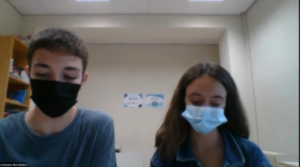News . Best Practices Science action on Health: prevention of Covid.19 at the school supported by participatory research (Best Practice Spain)

This good practice reports an open schooling activity with an open scenario approach developed by the teacher Óscar González during the pandemic period. The activity was carried out in Escola Lestonnac from Barcelona (Spain) with 65 students of 16 years old. This open schooling initiative was supported by IRSI La Caixa.
CARE: The socio-scientific issue was on how to improve the prevention of Covid.19 at the school. The professionals that gave support were the scientific community from Escoles Sentinella project: science communicators, biologists, epidemiologists, paediatricians among others, helping on the dynamization of the participatory research activities and interacting with students at the final congress to support with the creation of the final recommendations.
KNOW: The activity we did is adapted to the curriculum, for example, in the subject Sciences of the Contemporary World in the 1st year of Baccalaureate, we work on the concept of Science and Pseudoscience and the importance of the working the scientific method. This is also worked on throughout different Obligatory Secondary Education (ESO, from 12- to 16-year-old) science subjects. The transdisciplinary knowledge included the following areas: social, technology, environment, economic, politics and Microbiology.
DO: Students developed Inquiry skills, communication skills, participation skills and transdisciplinary methodologies. The science actions included teamwork, collaborative learning within the class and with other stakeholders and that science useful to solve real-life challenges.
Findings about open schooling: Most of the skills and attitudes addressed in this activity are described at the curriculum, but far from that, as a teacher said, this is a need for the educational community.
Results for students: Discussion supported by participatory science has led to greater awareness of Covid-19 prevention and how the measures to achieve that can be improved by a participatory research process.